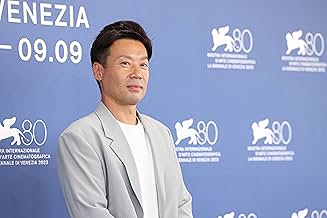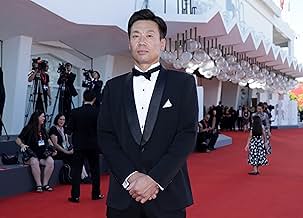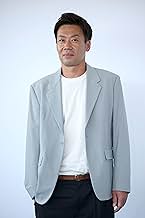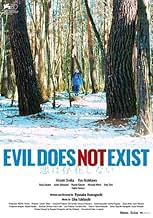Takumi and his daughter Hana live in Mizubiki Village, close to Tokyo. One day, the village inhabitants become aware of a plan to build a camping site near Takumi's house, offering residents... Read allTakumi and his daughter Hana live in Mizubiki Village, close to Tokyo. One day, the village inhabitants become aware of a plan to build a camping site near Takumi's house, offering residents a comfortable escape to nature.Takumi and his daughter Hana live in Mizubiki Village, close to Tokyo. One day, the village inhabitants become aware of a plan to build a camping site near Takumi's house, offering residents a comfortable escape to nature.
- Awards
- 17 wins & 45 nominations total
Featured reviews
I would describe this intriguing movie as made up of three main elements. The first one is the classical conflict between a rural community and the power of business here represented by a glamping (glamorous camping) project. This is the plot setting, but it is not the most important. The second element is represented by the consciousness and emotion of the characters, by their interactions inside the community and with the two representatives of the glamping company. The third element is the surprising and ambiguous ending where the title of the movie "Evil does not exist" becomes meaningful.
The collaboration of the director and the score composer Ishibashi Eiko is particularly interesting since the film originated from a request to create images to accompany a piece of music.
The collaboration of the director and the score composer Ishibashi Eiko is particularly interesting since the film originated from a request to create images to accompany a piece of music.
Ryusuke Hamaguchi has made some interesting movies in his career like Drive My Car, Happy Hour, and Asako I & II. While I haven't been wowed by his works, I appreciate many aspects of his style and approach.
Throughout, this movie has some wonderful colorful productions, camerawork, sound designs and atmosphere which helped add layers of the nature landscapes and environment. The narrative provides some interesting themes of nature, conflict of interest, humans and humans vs. Nature issues and explores some interesting aspects that are strong. The performances are all pretty good as well.
However, I am a bit underwhelmed with certain aspects as I found some of the themes feeling a little uneven to work Hamaguchi is wanting to express. Especially when it comes to the characters as while I did found some of the characters interesting, I didn't feel too emotionally connected with their personalities and purpose which made it a bit difficult to fully invest at times.
The soundtrack is wonderful and the dialogue is solid. The film does suffer some pacing issues and with an ending that leaves to many interpretations which may be frustrating for some. Overall, despite it's flaws, it's mediative and nature experience made this movie pretty good.
Throughout, this movie has some wonderful colorful productions, camerawork, sound designs and atmosphere which helped add layers of the nature landscapes and environment. The narrative provides some interesting themes of nature, conflict of interest, humans and humans vs. Nature issues and explores some interesting aspects that are strong. The performances are all pretty good as well.
However, I am a bit underwhelmed with certain aspects as I found some of the themes feeling a little uneven to work Hamaguchi is wanting to express. Especially when it comes to the characters as while I did found some of the characters interesting, I didn't feel too emotionally connected with their personalities and purpose which made it a bit difficult to fully invest at times.
The soundtrack is wonderful and the dialogue is solid. The film does suffer some pacing issues and with an ending that leaves to many interpretations which may be frustrating for some. Overall, despite it's flaws, it's mediative and nature experience made this movie pretty good.
In a way it starts very cleverly with very slow nature scenes, illustrating how closely connected these people are to their natural surroundings, how they live off and in harmony with the land. They gather wood for heating, they collect spring water for drinking and cooking, they recharge by walking long distances and admiring the stunning beauty of the surroundings, they memorize the different trees, they look out for wild animals, they help each other.
And then Hamaguchi is the perfect director to create a scene showing a public gathering with public speakers and audience interaction. He did a lengthy scene in Happy Hour as well. He can create meaningful dialogue with stand-out lines. And quite a bit of tension. And we move to the theme of capitalism corrupting everything in its path, with no regard for the destruction it leaves behind. It's facts, figures, stats, consultant advice, bending the law and using it to your advantage. The waste of five people is still below the accepted limit of pollution. It's better than city water anyway.
Then we dig deeper into the struggles of the glamping company workers, who are caught between empathizing with the locals and working for a man who wants to make money. He is not exactly a ruthless money man, he is actually trying to run a profitable business and sees the bottom line. The advisor is the cynical one. But the director takes the advice to heart. The funds are received and partially spent, he can't back down.
And then there's the enigmatic Takumi, the quiet, but trusted lumberjack, or jack of all trades and the poor hapless Takahashi, the former talent agent who experiences a sudden urge to commune with nature.
Slow start that kind of makes sense in the grand scheme of things, but it still tests your patience, and indeed a very odd, somewhat upsetting and inexplicable ending. The middle part is sublime but the rest didn't quite gel well together.
I read the director's explanation, but it's still not coming through in my opinion.
And then Hamaguchi is the perfect director to create a scene showing a public gathering with public speakers and audience interaction. He did a lengthy scene in Happy Hour as well. He can create meaningful dialogue with stand-out lines. And quite a bit of tension. And we move to the theme of capitalism corrupting everything in its path, with no regard for the destruction it leaves behind. It's facts, figures, stats, consultant advice, bending the law and using it to your advantage. The waste of five people is still below the accepted limit of pollution. It's better than city water anyway.
Then we dig deeper into the struggles of the glamping company workers, who are caught between empathizing with the locals and working for a man who wants to make money. He is not exactly a ruthless money man, he is actually trying to run a profitable business and sees the bottom line. The advisor is the cynical one. But the director takes the advice to heart. The funds are received and partially spent, he can't back down.
And then there's the enigmatic Takumi, the quiet, but trusted lumberjack, or jack of all trades and the poor hapless Takahashi, the former talent agent who experiences a sudden urge to commune with nature.
Slow start that kind of makes sense in the grand scheme of things, but it still tests your patience, and indeed a very odd, somewhat upsetting and inexplicable ending. The middle part is sublime but the rest didn't quite gel well together.
I read the director's explanation, but it's still not coming through in my opinion.
This film was supposed to be a 30 minute cinematic accompaniment to a score that the director's friend made, only that during the collection of video material Hamaguchi had this story idea and made a full feature film instead. The story starts off intriguing: a small Japanese community in the mountains is slightly challenged by the arrival of a company that wants to build a camping resort in their area without any knowledge of or interest in local issues or the damage they would do. There is even a long town hall discussion between the company representatives and the townsfolk which was truly inspiring. I mean, I can't imagine a European or American community reacting in such a measured, well mannered, well thought out and informed manner.
But this is where the movie veers into the absurd. People make life changing decisions in seconds, without being challenged by the ones around them - kind of like Hamaguchi's decision to finish the film the way he did, musical score and nature scenes take the place of plot and then it's one of those WTF endings. Presumably, the author wanted us to make our own mind about what the movie is about. Well, director-sama, that's the same thing as having nothing in particular to say.
The cinematography was good, the music excellent, the interactions between people natural, authentic, deep. The story was absolute rubbish.
Bottom line: in the end, a short cinematic companion to a music score became a very long and obtuse cinematic companion to a music score. Top marks for the music!
But this is where the movie veers into the absurd. People make life changing decisions in seconds, without being challenged by the ones around them - kind of like Hamaguchi's decision to finish the film the way he did, musical score and nature scenes take the place of plot and then it's one of those WTF endings. Presumably, the author wanted us to make our own mind about what the movie is about. Well, director-sama, that's the same thing as having nothing in particular to say.
The cinematography was good, the music excellent, the interactions between people natural, authentic, deep. The story was absolute rubbish.
Bottom line: in the end, a short cinematic companion to a music score became a very long and obtuse cinematic companion to a music score. Top marks for the music!
It's funny to see people who no doubt gushed over "Perfect Days" dismiss "Evil Does Not Exist" as "boring" and "obscure". Like PD, it begins by following a man's quotidian routine: chopping wood, drawing water, identifying wild plants, teaching his daughter the names of trees. Perhaps the fact that he lives in a mountain town of no architectural or historical significance is what turns them off, but I found Takumi's activities as riveting as those of PD's public toilet cleaner.
As in "Drive My Car", we're exposed to a Japan that a few visitors--including many Japanese--have seen. As someone who was raised in Japan and returns regularly, I was thrilled to see a mountain location like the places I visited last year. I also found the plot--the incursion of a glamping company on the town's pristine land--riveting. What began as a fight-the-power, urban-rural plot turned out completely differently from the norm, a surprise I'm still thinking about days later.
As in "Drive My Car", we're exposed to a Japan that a few visitors--including many Japanese--have seen. As someone who was raised in Japan and returns regularly, I was thrilled to see a mountain location like the places I visited last year. I also found the plot--the incursion of a glamping company on the town's pristine land--riveting. What began as a fight-the-power, urban-rural plot turned out completely differently from the norm, a surprise I'm still thinking about days later.
Did you know
- TriviaIn an interview with "The Los Angeles Times" published on May, 2, 2024, director Ryûsuke Hamaguchi decided to cast Hitoshi Omika as the lead role after Omika spent much time driving Hamaguchi around to rural locations in Japan to pick out locations to film for the director's concert film "Gift". This somewhat mirrored the plot of Hamaguchi's "Drive My Car".
- SoundtracksFether
composed by Eiko Ishibashi
- How long is Evil Does Not Exist?Powered by Alexa
Details
- Release date
- Country of origin
- Language
- Also known as
- El mal no existe
- Filming locations
- Production companies
- See more company credits at IMDbPro
Box office
- Gross US & Canada
- $831,685
- Opening weekend US & Canada
- $42,752
- May 5, 2024
- Gross worldwide
- $3,261,306
- Runtime
- 1h 46m(106 min)
- Color
- Sound mix
- Aspect ratio
- 1.66 : 1
Contribute to this page
Suggest an edit or add missing content

























